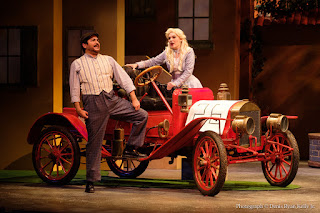Indianapolis Opera stages a buoyant, sturdy "L'Elisir d'Amore"
 |
| Nemorino and Adina negotiate their way toward love, using Dulcamara's car as a prop. |
There's some mild updating that allows for an outreach to the Indianapolis brand of motorsports: A vintage car comes onstage as the quack doctor Dulcamara makes his entrance, pushed by Indycar driver Zach Veatch, appearing in his opera debut and probably happy not to have a singing role. The sets and costuming looked cozy and idiomatic. The action now takes place in 1910, and the canny heroine Adina is here a cafe proprietor rather than a wealthy farm owner.
The dramatic difference in social position between her and the awkward swain Nemorino is thus muted. But the difficulty in making smooth the course of true love holds up, and much credit goes to the singers filling those roles, tenor Jesus Garcia and soprano Ashley Fabian. They are well supported, like the chorus and the other singers in named roles, by a usually adept, crystal-clear orchestra under the experienced hand of Alfred Savia.
Musically, there was little to cavil about in Saturday's performance. True, the vigorously deployed baritone of Ethan Vincent shot up above pitch at the end of Sergeant Belcore's entrance aria, and the opening chorus of Act 2 was a bit of a jumble on both entrance and exit. Otherwise, this was a fully rewarding performance.
The singing was generally enhanced and the comedy underscored by the director's notions: It was amusing to see the busboy Nemorino sing of unrequited love while absentmindedly emptying a salt shaker with his gestures, for example. But I could have done without the series of toilet trips by the village women as Gianetta's relaying some important gossip is hindered.
On the whole, whatever A. Scott Parry inserted by way of business hewed to the spirit of the piece. The movement always made sense, and there was even some incidental usefulness of the vintage racecar in the first act. In Act 2, the women in on the secret of Nemorino's unexpected wealth worked believably on gaining his interest, despite his having tippled too much of Dulcamara's elixir. The scene was among the delightful episodes in staging that neither undercut nor overloaded the ample comedy embedded in the music.
 |
| Alfred Savia is a well-established conductor around Indiana. |
Vincent's Belcore consistently projected the personality of a type inherited from ancient Roman comedy, the miles gloriosus or "braggart captain" (though he's only a sergeant). His forceful baritone and cock-of-the-walk carriage made him a believable rival — and an initially successful one — to Nemorino. Katherine Fili sparkled with her pert singing in the supporting role of Gianetta, who busies herself tidying up after Nemorino in the first scene and gradually assumes the time-honored function of soubrette.
Like everyone else, her suitability was exemplary. In short, the show never had to run even one lap under the yellow flag.



I could not have said better. Thank you Jay!
ReplyDeleteThanks for the great revue! I saw the show on Friday night and agree 100% with your assessment. This was the best production yet under the direction of David Starkey, the opera company's General Director. The show was perfectly cast with sets and costuming that were totally professional. The pit orchestra worked in tandem with the stage performances and the blending of music and lyric was seamless. Savia did a great job! Jamie Gibbs
ReplyDelete